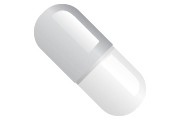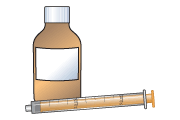Fluoxetine for obsessive compulsive disorder (OCD), depression and bulimia nervosa
This leaflet is for parents and carers about how to use this medicine in children. Our information may differ from that provided by the manufacturers, because their information usually relates to adults. Read this leaflet carefully. Keep it somewhere safe so that you can read it again.
Do not stop giving this medicine suddenly, as your child could get withdrawal symptoms.
Name of medicine
Fluoxetine
Brand names: Prozac®, Prozep®, Olena®, Oxactin®
This leaflet is about fluoxetine. It can be used to treat various conditions, including depression, obsessive compulsive disorder and bulimia nervosa.
Why is it important for my child to take fluoxetine?
Fluoxetine is a type of drug called a selective serotonin reuptake inhibitor, which are commonly known as SSRIs. SSRIs increase the activity of a chemical called serotonin in the brain. This helps to reduce the symptoms of OCD or bulimia nervosa, particularly when used with therapy. It also helps to reduce the symptoms of depression and to improve mood and behaviour.
What is fluoxetine available as?
Capsules: 20 mg, 60 mg (may contain lactose or gelatin)
Dispersible tablets: 20 mg (may contain sorbitol)
Liquid medicine: 20 mg in 5 mL (contains sucrose and a small amount of alcohol)
When should I give fluoxetine
Fluoxetine is usually given once each day, this is usually in the morning. Give the medicine at about the same time each day so that this becomes part of your child’s daily routine, which will help you to remember.
How much should I give?
Your doctor will work out the amount of fluoxetine (the dose) that is right for your child. The dose will be shown on the medicine label.
Your doctor may suggest that your child has a low dose to start with. They may then increase the dose as your child gets used to the medicine, depending on how your child responds to it.
It is important that you follow your doctor’s instructions about how much to give.
How should I give fluoxetine?

Capsules
- Capsules should be swallowed with a glass of water, squash or juice. Your child should not chew the capsule.

Dispersible tablets (Olena)
Dispersible tablets can be swallowed whole with a glass of water or juice. Your child should not chew the tablet.
You can disperse the tablet in water. Your doctor or pharmacist will tell you how much liquid to use. Make sure your child drinks it all straight away. Do not crush these tablets.

Liquid medicine
Measure out the right amount using a medicine spoon or oral syringe. You can get these from your pharmacist. Do not use a kitchen teaspoon as it will not give the right amount.
When should the medicine start working?
It usually takes about 2 weeks for fluoxetine to start working but may take longer. Continue to give the medicine to your child during this time. If you are not sure whether it is helping, discuss this with your doctor but continue to give the medicine.
What if my child is sick (vomits)?
- If your child is sick less than 30 minutes after having a dose of fluoxetine, give them the same dose again.
- If your child is sick more than 30 minutes after having a dose of fluoxetine, do not give them another dose. Wait until the next normal dose.
If your child is sick again, seek advice from your family doctor, nurse, pharmacist, or hospital. They will decide what to do based on your child’s condition and the specific medicine involved.
What if I forget to give it?
Give the missed dose when you remember during the day, as long as this is at least 12 hours before the next dose of fluoxetine is due.
Never give a double dose of fluoxetine.
What if I give too much?
If you think you may have given your child too much fluoxetine, contact your doctor or local NHS services (details at end of leaflet). Have the medicine packet with you if you telephone for advice.
Are there any possible side effects?
We use medicines to make our children better, but sometimes they have other effects that we don’t want (side effects).
Side effects you must do something about
If your child seems confused or agitated and has a fever (temperature above 38°C), muscle stiffness and a rapid heartbeat, take them to hospital or call an ambulance straight away. They may have a rare but serious reaction called serotonin syndrome.
If your child gets swelling of the eyes, face or lips, a rash, redness, itchiness, blistering or peeling of the skin, or has difficulty breathing, take them to your doctor or hospital straight away. They may be allergic to fluoxetine.
Very rarely, fluoxetine can cause seizures (fits). If your child has a seizure, telephone for an ambulance. Do not restrain your child but try to make sure that they cannot hurt themselves (e.g. put a cushion under their head and move them away from furniture).
If your child has trouble focusing, seems confused, unsteady or disorientated, or has hallucinations (seeing things that are not there), contact your doctor straight away.
If your child feels low or suicidal, tense, nervous, worried or on edge, contact your doctor as soon as possible.
Other side-effects you need to know about
Your child may get some of the following side effects when they first start taking fluoxetine. These usually wear off after a few days as your child gets used to the medicine. If they are still a problem after a week, or you are worried, contact your doctor but continue to give fluoxetine.
Your child may get indigestion, stomach ache, feel sick or be sick (vomit). Giving each dose with some food may help.
Your child may get diarrhoea or constipation (difficulty doing a poo). They may have difficulty passing urine (doing a wee).
They may get headaches.
They may have difficulty sleeping or have nightmares, or they may feel more sleepy and tired than normal.
The fluoxetine can affect the ability to do skilled tasks such as driving, riding a bicycle or playing sports. Your child should take care when doing tasks that require coordination until they get used to the medicine.
Your child’s appetite may be affected – they may feel more or less hungry than usual. Tell your doctor if your child gains or loses a lot of weight.
They may have difficulty swallowing. Try giving your child soft food to eat.
They may have a dry mouth, or a metallic or bitter taste in the mouth – eating citrus fruits (oranges), taking sips of water or sucking on sugar-free boiled (hard) sweets may help.
They may produce a milky substance from the nipples. This is nothing to worry about. Contact your doctor if this happens.
Your child’s skin will be more sensitive to sunlight. Keep them out of strong sun. When outdoors, they should wear a long-sleeved top, trousers and a hat and should use a high-factor sun screen (at least SPF 30).
There may sometimes be other side effects that are not listed above. If you notice anything unusual and are concerned, contact your doctor. You can report any suspected side effects to a UK safety scheme at mhra.gov.uk/yellowcard
Can other medicines be given at the same time as fluoxetine?
- You can give your child medicines that contain paracetamol or ibuprofen, unless your doctor has told you not to.
fluoxetine should not be taken with some medicines that you get on prescription. It is important to tell your doctor and pharmacist about any other medicines your child is taking before starting fluoxetine.
Check with your doctor or pharmacist before giving any other medicines to your child. This includes herbal and complementary medicines.
Is there anything else I need to know about this medicine?
Do not stop taking fluoxetine suddenly, as your child may get withdrawal effects (dizziness, feeling sick, pins and needles, headache and anxiety).
If you think someone else may have taken the medicine by accident, contact your doctor for advice.
- If you or your child wants to stop fluoxetine, discuss this with your doctor. They may want to reduce the dose slowly.
- Do not change the dose without discussing this with your doctor.
- If your daughter thinks she might be pregnant, she should see her doctor as soon as possible and continue taking fluoxetine in the meantime.
- Only give fluoxetine to your child. Never give it to anyone else, even if their condition appears to be the same, as this could do harm.
- Make sure that you always have enough medicine. Order a new prescription at least 2 weeks before you will run out.
- Make sure that the medicine you have at home has not reached the ‘use by’ date on the packaging. Give old medicines to your pharmacist to dispose of.
Where should I keep this medicine?
- Keep the medicine in a cupboard, away from heat and direct sunlight.
- It does not need to be kept in the fridge.
- Make sure that children cannot see or reach the medicine.
- Keep the medicine in the container it came in.
Who to contact for more information?
Your child’s doctor or pharmacist will be able to give you more information about fluoxetine and about other medicines used to treat your child’s condition.
England: NHS 111
Tel 111
www.nhs.ukScotland: NHS 24
Tel 111
www.nhs24.scotNorthern Ireland: NI Direct
Wales: NHS 111 Wales
Tel 111
www.111.wales.nhs.ukAnorexia and Bulimia Care
03000 11 12 13
www.anorexiabulimiacare.org.uk/BEAT Eating Disorders
0808 801 0677
www.beateatingdisorders.org.uk/ChildLine
0800 1111
www.childline.org.ukMind (mental health support)
0300 123 3393
www.mind.org.ukSamaritans
116 123
www.samaritans.orgYoung Minds - parent helpine
0808 802 5544
www.youngminds.org.ukCopyright disclaimer
Version [3]. © NPPG, RCPCH and WellChild, all rights reserved. Review by November 2022.
The primary source for the information in this leaflet is the British National Formulary for Children. For details on any other sources used for this leaflet, please contact us through our website, www.medicinesforchildren.org.uk.
We take great care to make sure that the information in this leaflet is correct and up-to-date. However, medicines can be used in different ways for different patients. It is important that you ask the advice of your doctor or pharmacist if you are not sure about something. This leaflet is about the use of these medicines in the UK, and may not apply to other countries. The Royal College of Paediatrics and Child Health (RCPCH), the Neonatal and Paediatric Pharmacists Group (NPPG), WellChild and the contributors and editors cannot be held responsible for the accuracy of information, omissions of information, or any actions that may be taken as a consequence of reading this leaflet.
